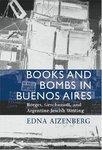
Book Summary
On July 18, 1994, the Asociacion Mutual Israelita Argentina (AMIA), which housed major Argentine Jewish organizations and served as a storehouse of Hebrew, Yiddish, and Argentine Jewish documents and literature, was bombed by terrorists. Although over 80 people were killed and the bomb leveled a city block in downtown Buenos Aires, the perpetrators were never found. Taking the bombing as her starting point, Edna Aizenberg crafts an unusual and powerful study of two canonical Argentine writers, Jorge Luis Borges and Alberto Gerchunoff. Examining in particular the literary and cultural reverberations in other authors of Gerchunoff's 1910 story collection, The Jewish Gauchos and Borges' Judaically inspired work, Aizenberg delves into the primary issues of Argentine and Latin American Jewish cultural production: Holocaust writing, resistance to dictatorship, pluralism and identity, and the position of the writer-scholar as a direct and vital participant in the transformation of culture and society. Situating Latin American Jewish literature within the multiple contexts of the Holocaust, postmodernism, and postcolonialism, Aizenberg argues that a literature celebrating pastiche, hybridity, and carnivalization is more democratic than literature that does not. She makes a brave case for the power of the pen in a contemporary world dominated by the power of the sword.
Book Details
| Book Name | Books And Bombs In Buenos Aires: Borges, Gerchunoff, And Argentine Jewish Writing |
| Author | Edna Aizenberg |
| Publisher | Brandeis University Press (Feb 2005) |
| ISBN | 9781584652540 |
| Pages | 212 |
| Language | English |
| Price | 1306 |








